Mental Health Care Report: Case Study of Perinatal Mental Health
VerifiedAdded on 2023/01/03
|6
|881
|68
Report
AI Summary
This report addresses a case study involving a 22-year-old woman, Lucinda, who is pregnant with her second child and experiencing mental health concerns. The report identifies urgent risk areas, such as the potential for postpartum depression, given Lucinda's previous difficult delivery and current feelings of fear and unhappiness. It proposes nursing interventions, including referring Lucinda to a psychologist specializing in postpartum disorders, providing coping strategies, and offering moral support through follow-up communication. The report also discusses legal and professional issues, emphasizing the importance of nurses providing quality care while respecting patient dignity and adhering to ethical codes and nursing standards. The analysis is supported by relevant literature and aims to provide a comprehensive understanding of the case and appropriate interventions.
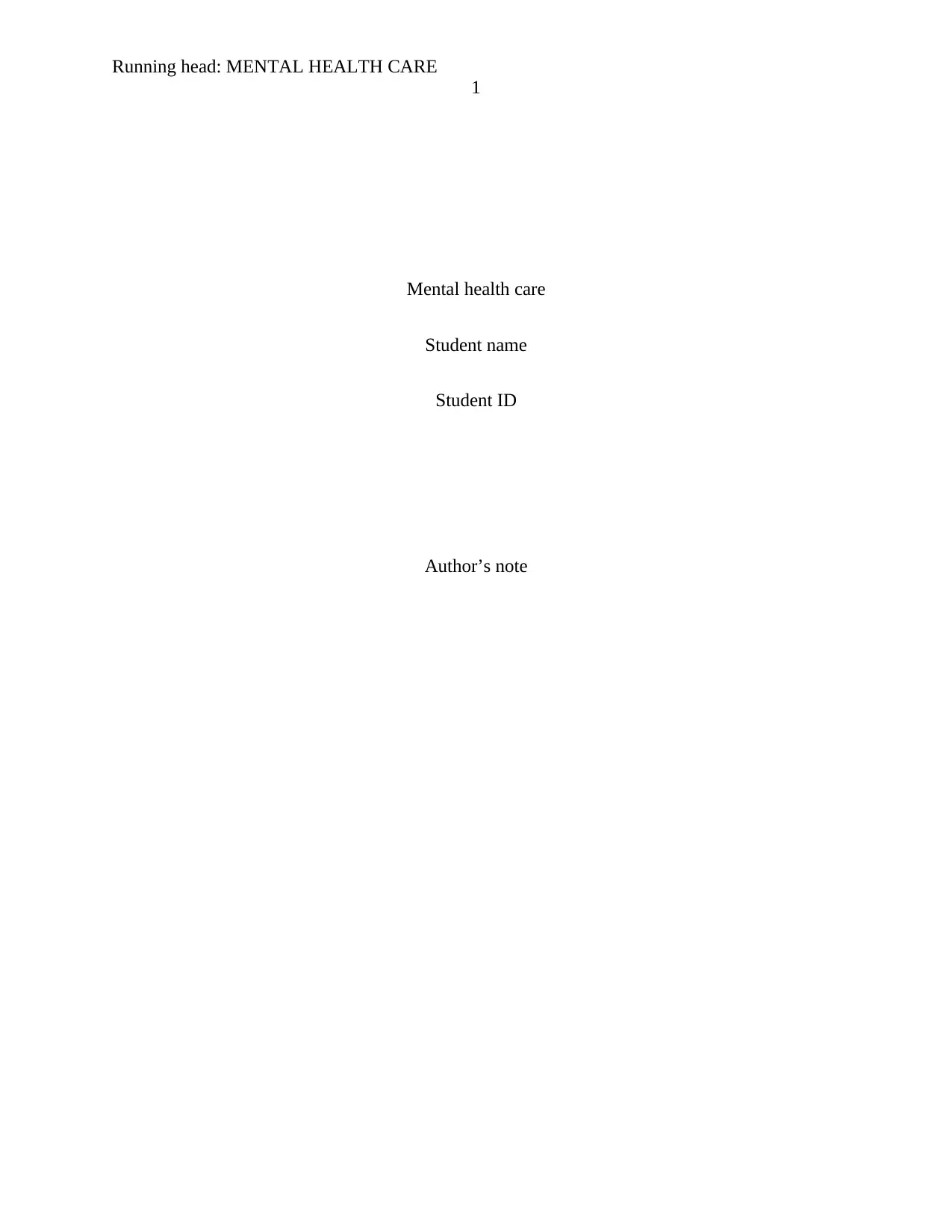
Running head: MENTAL HEALTH CARE
1
Mental health care
Student name
Student ID
Author’s note
1
Mental health care
Student name
Student ID
Author’s note
Paraphrase This Document
Need a fresh take? Get an instant paraphrase of this document with our AI Paraphraser
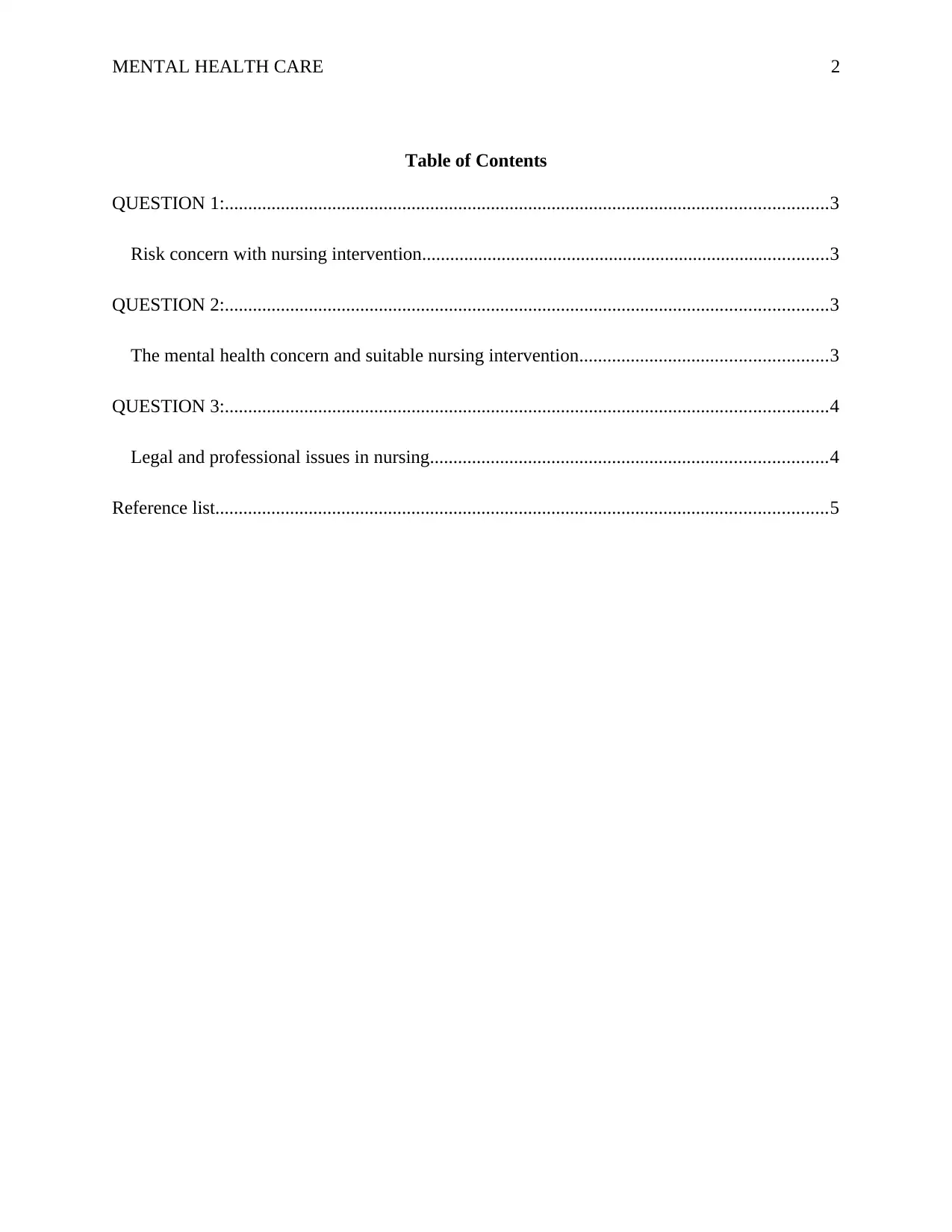
MENTAL HEALTH CARE 2
Table of Contents
QUESTION 1:.................................................................................................................................3
Risk concern with nursing intervention.......................................................................................3
QUESTION 2:.................................................................................................................................3
The mental health concern and suitable nursing intervention.....................................................3
QUESTION 3:.................................................................................................................................4
Legal and professional issues in nursing.....................................................................................4
Reference list...................................................................................................................................5
Table of Contents
QUESTION 1:.................................................................................................................................3
Risk concern with nursing intervention.......................................................................................3
QUESTION 2:.................................................................................................................................3
The mental health concern and suitable nursing intervention.....................................................3
QUESTION 3:.................................................................................................................................4
Legal and professional issues in nursing.....................................................................................4
Reference list...................................................................................................................................5
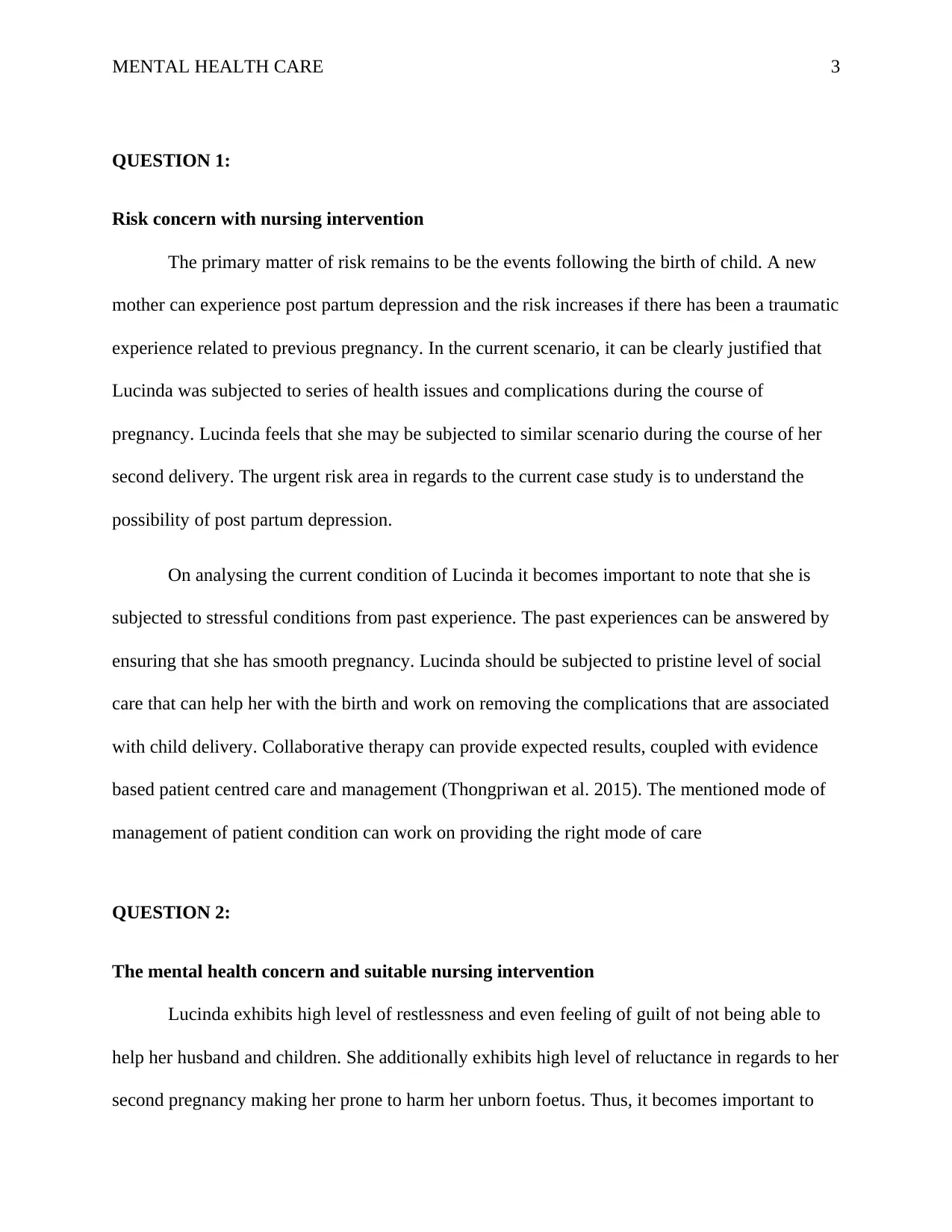
MENTAL HEALTH CARE 3
QUESTION 1:
Risk concern with nursing intervention
The primary matter of risk remains to be the events following the birth of child. A new
mother can experience post partum depression and the risk increases if there has been a traumatic
experience related to previous pregnancy. In the current scenario, it can be clearly justified that
Lucinda was subjected to series of health issues and complications during the course of
pregnancy. Lucinda feels that she may be subjected to similar scenario during the course of her
second delivery. The urgent risk area in regards to the current case study is to understand the
possibility of post partum depression.
On analysing the current condition of Lucinda it becomes important to note that she is
subjected to stressful conditions from past experience. The past experiences can be answered by
ensuring that she has smooth pregnancy. Lucinda should be subjected to pristine level of social
care that can help her with the birth and work on removing the complications that are associated
with child delivery. Collaborative therapy can provide expected results, coupled with evidence
based patient centred care and management (Thongpriwan et al. 2015). The mentioned mode of
management of patient condition can work on providing the right mode of care
QUESTION 2:
The mental health concern and suitable nursing intervention
Lucinda exhibits high level of restlessness and even feeling of guilt of not being able to
help her husband and children. She additionally exhibits high level of reluctance in regards to her
second pregnancy making her prone to harm her unborn foetus. Thus, it becomes important to
QUESTION 1:
Risk concern with nursing intervention
The primary matter of risk remains to be the events following the birth of child. A new
mother can experience post partum depression and the risk increases if there has been a traumatic
experience related to previous pregnancy. In the current scenario, it can be clearly justified that
Lucinda was subjected to series of health issues and complications during the course of
pregnancy. Lucinda feels that she may be subjected to similar scenario during the course of her
second delivery. The urgent risk area in regards to the current case study is to understand the
possibility of post partum depression.
On analysing the current condition of Lucinda it becomes important to note that she is
subjected to stressful conditions from past experience. The past experiences can be answered by
ensuring that she has smooth pregnancy. Lucinda should be subjected to pristine level of social
care that can help her with the birth and work on removing the complications that are associated
with child delivery. Collaborative therapy can provide expected results, coupled with evidence
based patient centred care and management (Thongpriwan et al. 2015). The mentioned mode of
management of patient condition can work on providing the right mode of care
QUESTION 2:
The mental health concern and suitable nursing intervention
Lucinda exhibits high level of restlessness and even feeling of guilt of not being able to
help her husband and children. She additionally exhibits high level of reluctance in regards to her
second pregnancy making her prone to harm her unborn foetus. Thus, it becomes important to
⊘ This is a preview!⊘
Do you want full access?
Subscribe today to unlock all pages.

Trusted by 1+ million students worldwide
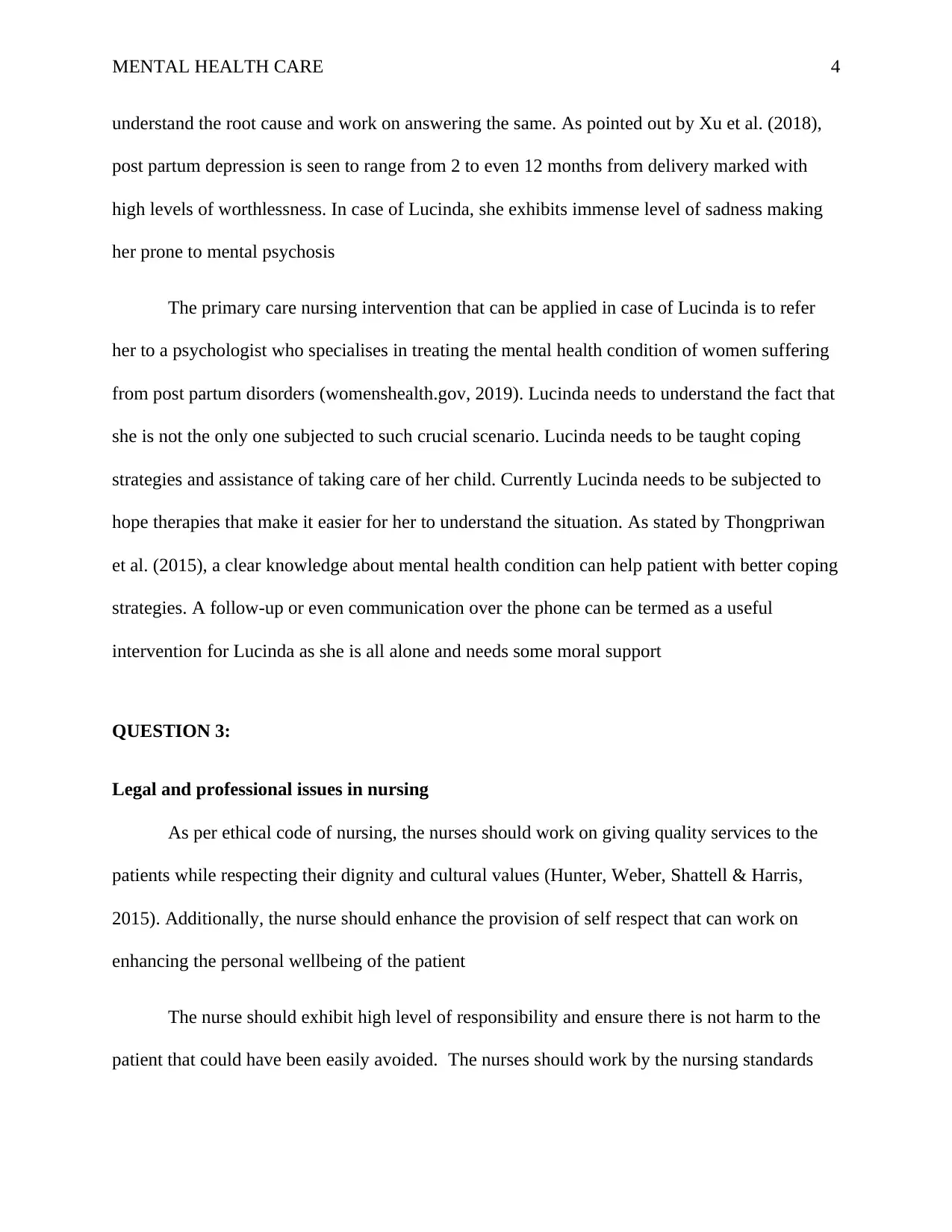
MENTAL HEALTH CARE 4
understand the root cause and work on answering the same. As pointed out by Xu et al. (2018),
post partum depression is seen to range from 2 to even 12 months from delivery marked with
high levels of worthlessness. In case of Lucinda, she exhibits immense level of sadness making
her prone to mental psychosis
The primary care nursing intervention that can be applied in case of Lucinda is to refer
her to a psychologist who specialises in treating the mental health condition of women suffering
from post partum disorders (womenshealth.gov, 2019). Lucinda needs to understand the fact that
she is not the only one subjected to such crucial scenario. Lucinda needs to be taught coping
strategies and assistance of taking care of her child. Currently Lucinda needs to be subjected to
hope therapies that make it easier for her to understand the situation. As stated by Thongpriwan
et al. (2015), a clear knowledge about mental health condition can help patient with better coping
strategies. A follow-up or even communication over the phone can be termed as a useful
intervention for Lucinda as she is all alone and needs some moral support
QUESTION 3:
Legal and professional issues in nursing
As per ethical code of nursing, the nurses should work on giving quality services to the
patients while respecting their dignity and cultural values (Hunter, Weber, Shattell & Harris,
2015). Additionally, the nurse should enhance the provision of self respect that can work on
enhancing the personal wellbeing of the patient
The nurse should exhibit high level of responsibility and ensure there is not harm to the
patient that could have been easily avoided. The nurses should work by the nursing standards
understand the root cause and work on answering the same. As pointed out by Xu et al. (2018),
post partum depression is seen to range from 2 to even 12 months from delivery marked with
high levels of worthlessness. In case of Lucinda, she exhibits immense level of sadness making
her prone to mental psychosis
The primary care nursing intervention that can be applied in case of Lucinda is to refer
her to a psychologist who specialises in treating the mental health condition of women suffering
from post partum disorders (womenshealth.gov, 2019). Lucinda needs to understand the fact that
she is not the only one subjected to such crucial scenario. Lucinda needs to be taught coping
strategies and assistance of taking care of her child. Currently Lucinda needs to be subjected to
hope therapies that make it easier for her to understand the situation. As stated by Thongpriwan
et al. (2015), a clear knowledge about mental health condition can help patient with better coping
strategies. A follow-up or even communication over the phone can be termed as a useful
intervention for Lucinda as she is all alone and needs some moral support
QUESTION 3:
Legal and professional issues in nursing
As per ethical code of nursing, the nurses should work on giving quality services to the
patients while respecting their dignity and cultural values (Hunter, Weber, Shattell & Harris,
2015). Additionally, the nurse should enhance the provision of self respect that can work on
enhancing the personal wellbeing of the patient
The nurse should exhibit high level of responsibility and ensure there is not harm to the
patient that could have been easily avoided. The nurses should work by the nursing standards
Paraphrase This Document
Need a fresh take? Get an instant paraphrase of this document with our AI Paraphraser
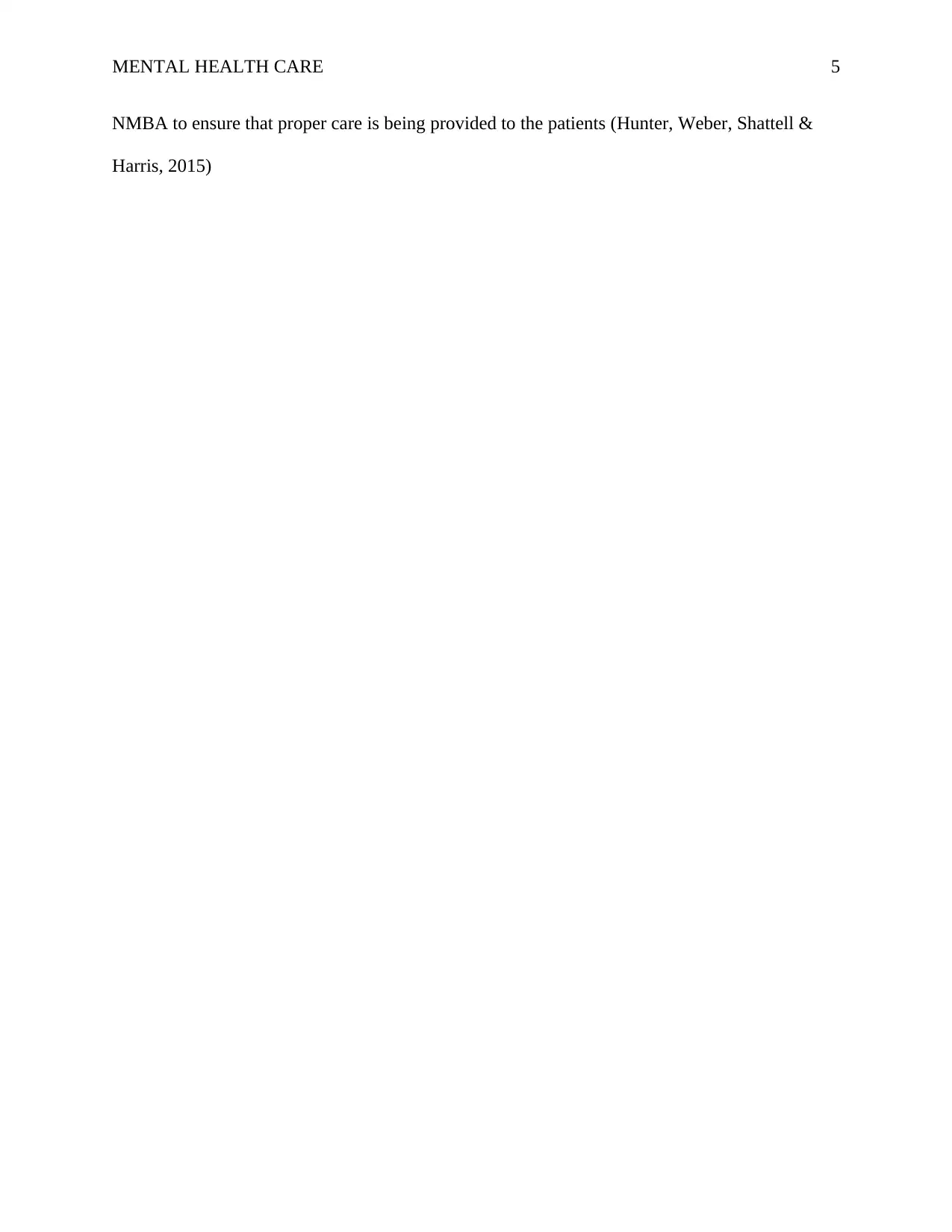
MENTAL HEALTH CARE 5
NMBA to ensure that proper care is being provided to the patients (Hunter, Weber, Shattell &
Harris, 2015)
NMBA to ensure that proper care is being provided to the patients (Hunter, Weber, Shattell &
Harris, 2015)
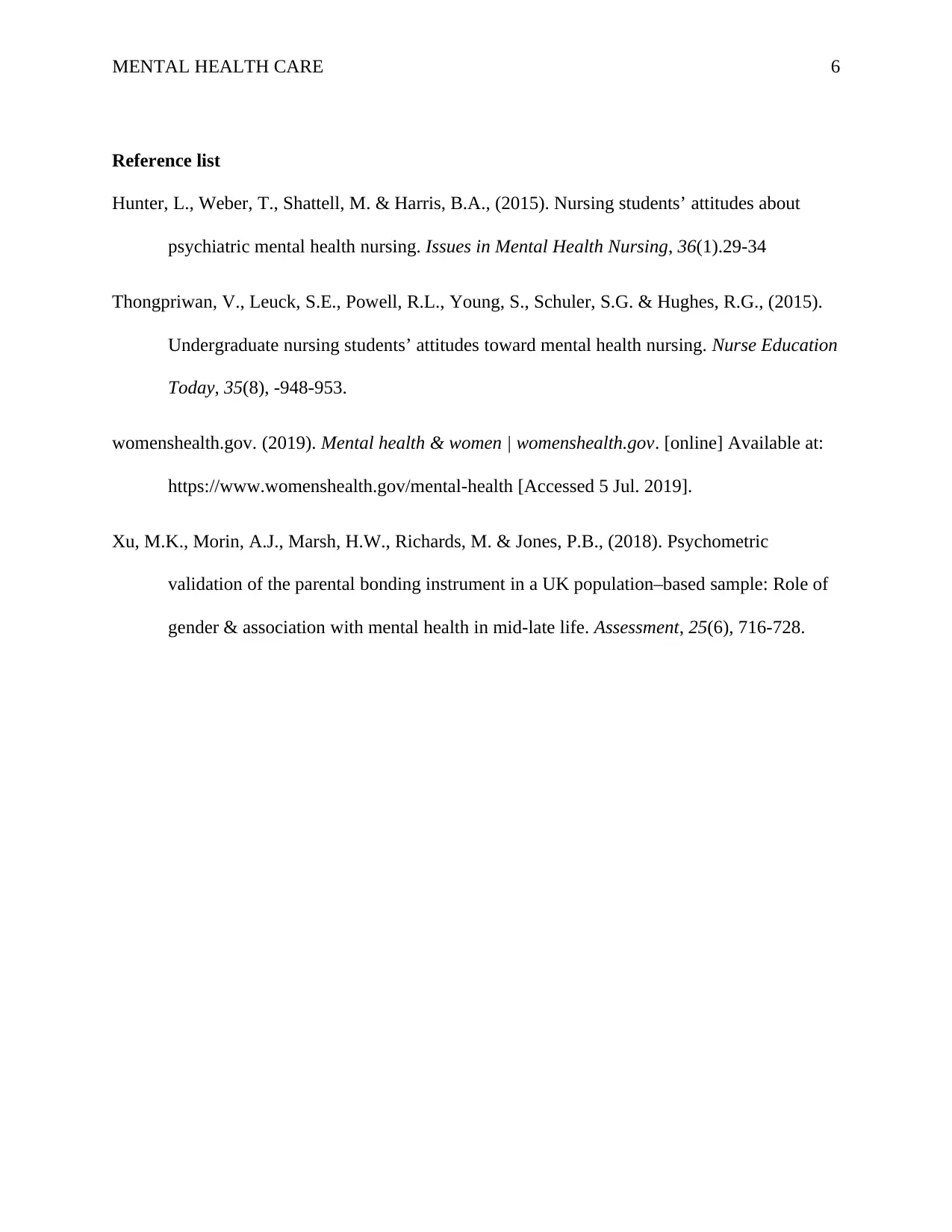
MENTAL HEALTH CARE 6
Reference list
Hunter, L., Weber, T., Shattell, M. & Harris, B.A., (2015). Nursing students’ attitudes about
psychiatric mental health nursing. Issues in Mental Health Nursing, 36(1).29-34
Thongpriwan, V., Leuck, S.E., Powell, R.L., Young, S., Schuler, S.G. & Hughes, R.G., (2015).
Undergraduate nursing students’ attitudes toward mental health nursing. Nurse Education
Today, 35(8), -948-953.
womenshealth.gov. (2019). Mental health & women | womenshealth.gov. [online] Available at:
https://www.womenshealth.gov/mental-health [Accessed 5 Jul. 2019].
Xu, M.K., Morin, A.J., Marsh, H.W., Richards, M. & Jones, P.B., (2018). Psychometric
validation of the parental bonding instrument in a UK population–based sample: Role of
gender & association with mental health in mid-late life. Assessment, 25(6), 716-728.
Reference list
Hunter, L., Weber, T., Shattell, M. & Harris, B.A., (2015). Nursing students’ attitudes about
psychiatric mental health nursing. Issues in Mental Health Nursing, 36(1).29-34
Thongpriwan, V., Leuck, S.E., Powell, R.L., Young, S., Schuler, S.G. & Hughes, R.G., (2015).
Undergraduate nursing students’ attitudes toward mental health nursing. Nurse Education
Today, 35(8), -948-953.
womenshealth.gov. (2019). Mental health & women | womenshealth.gov. [online] Available at:
https://www.womenshealth.gov/mental-health [Accessed 5 Jul. 2019].
Xu, M.K., Morin, A.J., Marsh, H.W., Richards, M. & Jones, P.B., (2018). Psychometric
validation of the parental bonding instrument in a UK population–based sample: Role of
gender & association with mental health in mid-late life. Assessment, 25(6), 716-728.
⊘ This is a preview!⊘
Do you want full access?
Subscribe today to unlock all pages.

Trusted by 1+ million students worldwide
1 out of 6
Related Documents
Your All-in-One AI-Powered Toolkit for Academic Success.
+13062052269
info@desklib.com
Available 24*7 on WhatsApp / Email
![[object Object]](/_next/static/media/star-bottom.7253800d.svg)
Unlock your academic potential
Copyright © 2020–2026 A2Z Services. All Rights Reserved. Developed and managed by ZUCOL.




